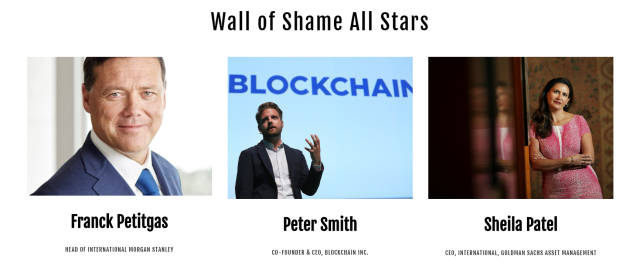Amid the outcry over the disappearance and apparent murder of Saudi Arabian journalist Jamal Khashoggi earlier this month, Treasury Secretary Steven Mnuchin announced yesterday that he will not participate in the Future Investment Initiative (FII) summit in Riyadh, Saudi Arabia, scheduled for October 23 to 25. Mnuchin joined a number of business and financial leaders—including International Monetary Fund chief Christine Lagarde, JPMorgan Chase CEO Jamie Dimon, and Uber CEO Dara Khosrowshahi—who have pulled out of the investor conference, which has been dubbed “Davos in the Desert.”
Despite those high-profile cancellations, it appears that at least one major figure from the cryptocurrency world, CEO Peter Smith of London-based wallet provider Blockchain, still plans to attend. (Smith did not reply to multiple requests for comment.) The FII site also lists two blockchain-related panels or talks, one titled “Digital Currency: How will the convergence of money and data change global commerce?” and another called “Money: Led by McKinsey & Company,” which promises to address the “rise of cryptocurrencies, blockchain technology, digital banking, and fintechs.” A spokesman for McKinsey, a global management consulting firm, declined to comment.
The conference is being hosted by Crown Prince Mohammed bin Salman, who is widely regarded as holding de facto political power in the kingdom. Branding himself as a reformer, he has passed legislation that put an end to the ban on women driving, but critics like Khashoggi, who was a columnist for the Washington Post, argued that such moves masked a clampdown on political freedoms, particularly the right to criticize the government. Known details of the team believed to have carried out Khashoggi’s murder suggest that the crown prince himself would have been aware of the plan. Some of the team members identified by Turkish officials were part of the royal guard, responsible for protecting senior members of the Saudi royal family.
An online group named Stop the Future Investment Initiative, organized in part by writer and human rights activist İyad el-Baghdadi, currently lists Blockchain’s Smith second on its “Wall of Shame All Stars.” Speaking at the World Economic Forum in the actual Davos, Switzerland, last year, Smith said, “I am very optimistic about the Middle East, and we plan to invest big there. I’m really excited about it. It’s a great chance to build a new financial infrastructure in the region.” At the time, he declined to say where the company might invest, but added, “What’s exciting is that there’s this big drive for change in the economies. Saudi Arabia and the UAE want to leapfrog into the digital age in financial technology.”
Image from the stopfii.com homepage.

The Stop the Future Investment Initiative site encourages people to tweet their displeasure at Smith and other announced participants who have not withdrawn from the conference. One critic who tweeted was Susan Benesch, director of the Dangerous Speech Project and a faculty associate at Berkman Klein Center for Internet & Society at Harvard. “I can’t understand why any individuals or companies would attend that meeting right now or would have failed to pull out at this point,” Benesch told BREAKER. “After so many individuals have pulled out—even Steven Mnuchin—attending would seem to send a signal of active support for the Saudi government, which two weeks after it apparently savagely murdered a brilliant and prominent Saudi journalist still has not given any public account of what happened.”
Saudi Arabia’s links to blockchain extend beyond the conference. In February, the country’s central bank signed a deal with blockchain payments company Ripple. A post on the Ripple company blog highlights the huge value of remittances sent from Saudi Arabia to other countries, reportedly totaling $37 billion in 2016. “Following Ripple’s recent pilot with the Saudi Arabian Monetary Authority, the [country’s] National Commercial Bank (NCB) has joined RippleNet,” the post reads. Blockchain giant ConsenSys has launched a partnership with Saudi Telecom, the largest mobile phone provider in the kingdom and one of the main providers of landline and internet connections.
As of press time, representatives from Ripple and ConsenSys had not responded to BREAKER’s inquiries about whether they would continue to work with Saudi Arabia. We will update if we hear back from any of the companies mentioned in this story.